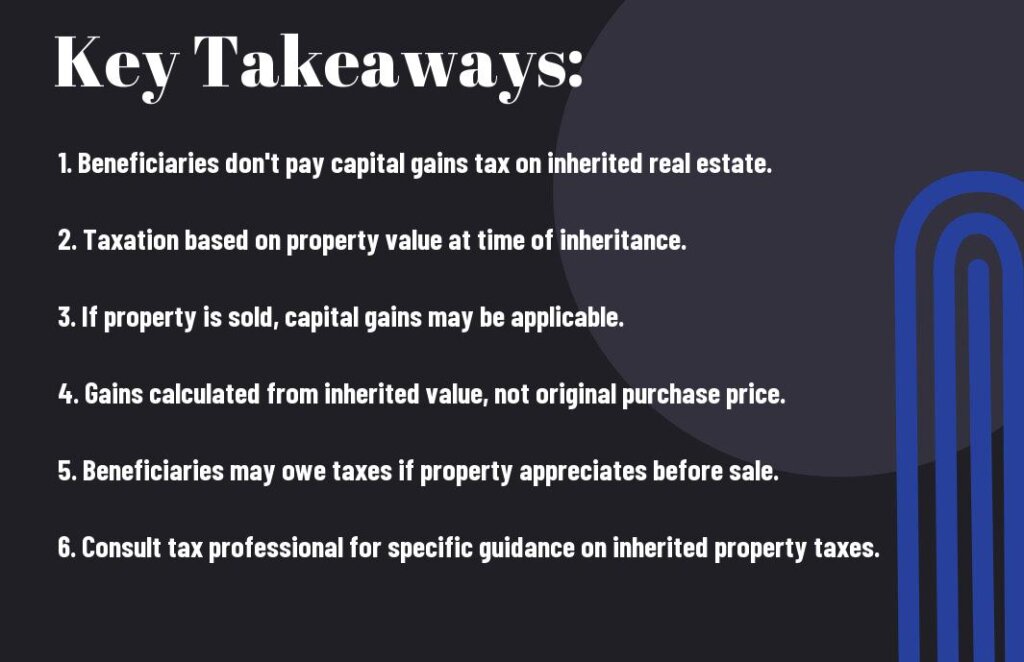Many beneficiaries may find themselves wondering about their tax obligations when inheriting real estate, particularly when it comes to capital gains tax. In this blog post, we will investigate into the complexities of whether beneficiaries are required to pay capital gains tax on inherited real estate, exploring important factors that can influence the tax implications of such inheritance.
Key Takeaways:
- Capital Gains Tax: Beneficiaries are typically subject to capital gains tax on inherited real estate if they choose to sell the property.
- Step-Up in Basis: Inherited real estate receives a step-up in basis to the fair market value at the time of the decedent’s death, which can reduce the capital gains tax burden for beneficiaries.
- Consultation: It is advisable for beneficiaries to consult with tax professionals or estate planners to understand their specific tax obligations and strategies for managing capital gains tax on inherited real estate.

Understanding Inheritance and Capital Gains Tax
Definition of Capital Gains Tax
On inheriting real estate, beneficiaries may be subject to capital gains tax. This tax is applied to the profit made from the sale of an asset, calculated as the difference between the sale price and the property’s fair market value at the time of inheritance.
How Inheritance is Taxed
Capital gains tax on inherited real estate is typically based on the property’s value at the time of the original owner’s death. If the property is sold for a higher price than this value, the beneficiary is responsible for paying capital gains tax on the difference.
Understanding the rules and implications of capital gains tax on inherited real estate is crucial for beneficiaries to effectively manage their tax obligations and financial planning.
Other Articles You Might Enjoy:
- How to Sell a Probate House in Texas in 2025
- How to Price Your Inherited Home in Houston: A Complete Guide
- Did You Inherit a House with a Mortgage? Learn Your Options
- Inheriting A Property in Texas: Laws, Probate & Options
- 5 Essential Steps to Sell Your Inherited Manufactured Home in Texas
The Impact of Inherited Real Estate on Tax Obligations
Basis Calculation for Inherited Property
Some beneficiaries may wonder how the basis for inherited property is determined for tax purposes. The basis of inherited real estate is usually the fair market value of the property at the time of the original owner’s death.
Calculation of Capital Gains on Sale of Inherited Property
On the sale of inherited property, beneficiaries may be required to pay capital gains tax on the difference between the sale price and the stepped-up basis. This stepped-up basis is the fair market value of the property at the time of inheritance, which can reduce the potential tax liabilities for beneficiaries.
Property passed down through inheritance can have significant tax implications. It is crucial for beneficiaries to understand the basis calculation and potential capital gains tax obligations when dealing with inherited real estate.

Legal Exemptions and Reductions
Primary Residence Exclusion
Exemptions are available for beneficiaries inheriting real estate, such as the Primary Residence Exclusion. This exclusion allows beneficiaries to exclude up to a certain amount of capital gains from the sale of an inherited primary residence. This can result in significant tax savings for beneficiaries.
Special Provisions for Surviving Spouses
To provide relief to surviving spouses inheriting real estate, special provisions are in place. Surviving spouses are entitled to additional exemptions and reductions in capital gains tax on inherited real estate. These provisions aim to lessen the tax burden on surviving spouses during what is already a difficult time.
Residence of the surviving spouse plays a crucial role in determining the extent of these special provisions. The tax laws take into account the length of time the surviving spouse has resided in the inherited property and whether they continue to use it as their primary residence.
Tax Planning Strategies
Now, when dealing with the complex issue of capital gains tax on inherited real estate, it is vital to consider various tax planning strategies to minimize the financial burden. Before making any decisions, it is crucial to understand how the capital gains tax on inherited property works. For more information on this topic, you can refer to How Does the Capital Gains Tax on Inherited Property Work?
Holding Period Considerations
Considerations must be made regarding the length of time the inherited property has been held. The holding period can impact the amount of capital gains tax owed, as assets held for longer periods may qualify for lower tax rates.
Consulting Tax Professionals
An important step in navigating the complexities of capital gains tax on inherited real estate is to consult with experienced tax professionals. They can provide personalized advice based on your specific situation, helping you make well-informed decisions to minimize tax liabilities.
Understanding the intricacies of tax laws and regulations can be overwhelming, but tax professionals have the expertise to guide you through the process efficiently. They can help you explore various tax planning strategies and ensure compliance with all legal requirements, ultimately optimizing your tax situation.
Conclusion
Presently, beneficiaries are generally not obligated to pay capital gains tax on inherited real estate. However, they may be liable for capital gains tax if the property is sold for a profit. It is important for beneficiaries to understand the tax implications and seek professional advice to ensure compliance with tax laws.
FAQ
Q: Are beneficiaries obligated to pay capital gains tax on inherited real estate?
A: Beneficiaries are typically not obligated to pay capital gains tax on inherited real estate. The cost basis of the property is “stepped up” to its fair market value at the time of the original owner’s death, which can reduce or eliminate capital gains tax liability for the beneficiaries.
Q: What is the cost basis of inherited real estate?
A: The cost basis of inherited real estate is the fair market value of the property at the time of the original owner’s death. This stepped-up basis is used to calculate capital gains tax when the property is later sold by the beneficiaries.
Q: Are there any exceptions to the rule that beneficiaries do not pay capital gains tax on inherited real estate?
A: In some cases, beneficiaries may be subject to capital gains tax on inherited real estate if the property was transferred through a trust or if the estate is subject to state estate tax. It is important to consult with a tax professional to understand any potential tax implications.
Q: How can beneficiaries minimize capital gains tax on inherited real estate?
A: Beneficiaries can minimize capital gains tax on inherited real estate by holding onto the property for at least one year before selling it, as this can qualify them for lower long-term capital gains tax rates. They can also consider using any available tax deductions or credits to offset capital gains tax liability.
Q: What should beneficiaries do if they have questions about capital gains tax on inherited real estate?
A: If beneficiaries have questions or concerns about capital gains tax on inherited real estate, it is recommended that they seek guidance from a qualified tax professional or estate planning attorney. These professionals can provide personalized advice based on the specific circumstances of the inheritance and help beneficiaries navigate any potential tax obligations.
Disclaimer:
The content provided on this blog is for informational purposes only. We are not attorneys or tax professionals. For personalized legal or tax advice, please consult with a qualified professional.
Written by Lisa Martinez, Founder of TX Cash Home Buyers

About The Company
TX Cash Home Buyers helps Texas homeowners sell quickly and simply — even in tough situations like repairs, inherited homes, or financial stress. Founded by Lisa Martinez, we’re known for our local experience, fair offers, and commitment to guiding sellers through off-market sales with clarity and care.




